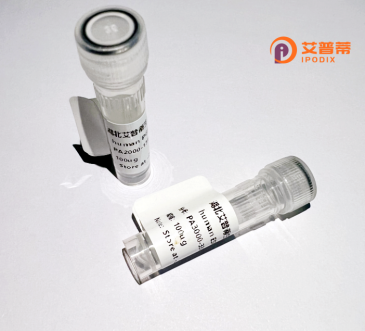
| 纯度 | >90%SDS-PAGE. |
| 种属 | Human |
| 靶点 | CACNB4 |
| Uniprot No | O00305 |
| 内毒素 | < 0.01EU/μg |
| 表达宿主 | E.coli |
| 表达区间 | 1-520aa |
| 氨基酸序列 | MSSSSYAKNGTADGPHSPTSQVARGTTTRRSRLKRSDGSTTSTSFILRQGSADSYTSRPSDSDVSLEEDREAIRQEREQQAAIQLERAKSKPVAFAVKTNVSYCGALDEDVPVPSTAISFDAKDFLHIKEKYNNDWWIGRLVKEGCEIGFIPSPLRLENIRIQQEQKRGRFHGGKSSGNSSSSLGEMVSGTFRATPTSTAKQKQKVTEHIPPYDVVPSMRPVVLVGPSLKGYEVTDMMQKALFDFLKHRFDGRISITRVTADISLAKRSVLNNPSKRAIIERSNTRSSLAEVQSEIERIFELARSLQLVVLDADTINHPAQLIKTSLAPIIVHVKVSSPKVLQRLIKSRGKSQSKHLNVQLVAADKLAQCPPEMFDVILDENQLEDACEHLGEYLEAYWRATHTTSSTPMTPLLGRNLGSTALSPYPTAISGLQSQRMRHSNHSTENSPIERRSLMTSDENYHNERARKSRNRLSSSSQHSRDHYPLVEEDYPDSYQDTYKPHRNRGSPGGYSHDSRHRL |
| 分子量 | 84.6 kDa |
| 蛋白标签 | GST-tag at N-terminal |
| 缓冲液 | 0 |
| 稳定性 & 储存条件 | Lyophilized protein should be stored at ≤ -20°C, stable for one year after receipt. Reconstituted protein solution can be stored at 2-8°C for 2-7 days. Aliquots of reconstituted samples are stable at ≤ -20°C for 3 months. |
| 复溶 | Always centrifuge tubes before opening.Do not mix by vortex or pipetting. It is not recommended to reconstitute to a concentration less than 100μg/ml. Dissolve the lyophilized protein in distilled water. Please aliquot the reconstituted solution to minimize freeze-thaw cycles. |
以下是关于重组人CACNB4蛋白的3篇参考文献,涵盖其功能、结构及疾病关联研究:
---
1. **文献名称**:*Mutations in the calcium channel β4 subunit (CACNB4) lead to neurological disorders*
**作者**:Escayg, A. et al.
**摘要**:本研究通过基因测序发现CACNB4基因的突变与人类特发性全身性癫痫和共济失调相关。利用重组人CACNB4蛋白表达实验,证明突变体显著降低钙通道电流密度,并破坏通道门控调控,提示其在神经兴奋性异常中的机制。
---
2. **文献名称**:*Structural basis of the β4 subunit regulation of voltage-gated calcium channels*
**作者**:Campiglio, M. et al.
**摘要**:通过冷冻电镜技术解析重组人CACNB4蛋白与CaV1.2钙通道核心亚基复合物的高分辨率结构,揭示β4亚基通过稳定通道开放构象和调节电压传感域移动,从而调控钙离子通透性及通道失活的分子机制。
---
3. **文献名称**:*Functional interaction of recombinant CACNB4 with CaV2.1 channels in neuroendocrine cells*
**作者**:Buraei, Z. & Yang, J.
**摘要**:在HEK293细胞中重组表达人CACNB4与CaV2.1钙通道,结合膜片钳技术证实β4亚基通过增强通道膜定位并加速激活/失活动力学,影响神经内分泌细胞的钙信号传导及递质释放。
---
这些研究从基因突变致病性、结构生物学及电生理学角度,解析了重组人CACNB4蛋白的功能机制。如需具体文章链接或补充文献,可进一步提供方向。
The human calcium voltage-gated channel auxiliary subunit beta 4 (CACNB4) is a regulatory protein that modulates the function of voltage-dependent calcium channels (VDCCs), particularly the Cav2.1 (P/Q-type) and Cav1 (L-type) subtypes. Encoded by the *CACNB4* gene, this beta subunit is part of a family of four β-subunits (β1–β4) that interact with the pore-forming α1 subunit of VDCCs to influence channel trafficking, gating kinetics, and membrane targeting. CACNB4 is highly expressed in the brain, especially in the cerebellum, hippocampus, and cerebral cortex, where it plays a critical role in neuronal excitability and neurotransmitter release.
Mutations in *CACNB4* have been linked to neurological disorders, including epilepsy, spinocerebellar ataxia, and idiopathic generalized epilepsy syndromes. Studies suggest that CACNB4 dysfunction disrupts calcium signaling, leading to altered neuronal firing patterns or synaptic transmission defects.
Recombinant CACNB4 protein, produced via heterologous expression systems (e.g., E. coli or mammalian cells), is widely used to study calcium channel biophysics, subunit interactions, and disease mechanisms. Its structural and functional characterization aids in developing targeted therapies for calcium channel-related pathologies. Research also explores its potential role in neuroprotection and as a biomarker for certain neurological conditions.
×